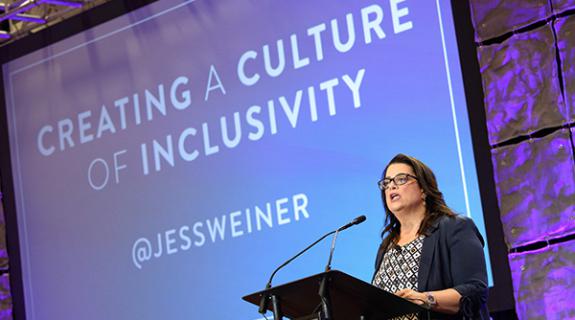“We don’t know what we don’t know.” says Jess Weiner at her session “Creating a Culture of Inclusivity.” Jess, as we learned recently, is a purveyor of a simple idea; we have the power to change the perception of how women and girls are perceived in media. But first, we have to be aware that there is an issue. Second, we have to know the solutions. Luckily, we had the chance to see Jess live at the Conference today, and she left us with more than a few ways to tackle this large issue.
Education and Media Literacy
As a culture, we have to accept our responsibility as storytellers. From CEO on down, all of us have a responsibility to tell authentic stories representing the world we live in. Jess harkened a story from working with Barbie. “Barbie was failing the birthday party test.” she said. Parents were apprehensive about buying Barbie for their kids, as eye shapes, textures and shapes were not reflective of them or their child. so Jess implemented what she calls a “Yes and” theory. For example, “Yes, girls love pink, they like to kick around the soccer ball and they also think about running for office one day.”
Earned Communication with Consumers
“Before you want to make a really good marketing campaign, wait until theres real substance behind that.” suggests Jess. “We verge into these faux empowerment programs.” speaking of brands who, with possibly good intentions, use a cultural moment for opportunity rather than a strategic purpose. In other words, this isn’t just about a one-off campaign. In fact, Jess stated she works no less than two years with a client, as it usually takes that amount of time for clients to see any kind of change. But don’t end up like, well, Pepsi. “Being in the moment might get you a clickthrough, but is not serving your demographic to help move forward their lives.”
Workforce Development
Jess suggests we work to learn what our biases are - both implicit and explicit - and then work to transform them. But Jess knows this is easier said than done, possibly because of the fear of being ‘found out.’ She says of employees’ fears “What will this signify to my boss or team if I take this Harvard test and look to see where I have weak spots?” The “Harvard test” Jess is speaking of is Project Implicit, whose only goal, according to their website, is to educate the public about hidden biases.
Then, Jess urged the room to “establish your north star.” If companies don’t stand for something, they will fall for anything. Companies must understand what their values are, and see if that aligns not just internally, but with their audience.
Lastly, Jess nudged the audience to consider possibly the most selfless act. “Leverage your privilege and power for another voice.” Often times, it’s not that diverse voices aren’t in the room. It’s that those voices are not empowered in the room. Or, as Jess displayed a quote from Verna Myers on the screen in her closing remarks; “Diversity is being invited to the party and inclusion is being asked to dance.”
It’s clear all of us can take part in making our marketing look more like the world we live in. But first, we’ve got to accept that status quo is not what we want.
Tags:
























































